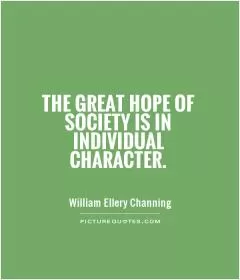The home is the chief school of human virtues

The home is the chief school of human virtues
William Ellery Channing, a prominent figure in the Unitarian movement of the early 19th century, believed that the home is the chief school of human virtues. This idea reflects his belief in the importance of family and the role it plays in shaping individuals' character and moral development.Channing believed that the home is where individuals first learn about love, compassion, and empathy. It is within the family unit that children are taught the values and principles that will guide them throughout their lives. Parents serve as the primary teachers, imparting important lessons about honesty, integrity, and kindness. Channing believed that the virtues instilled in the home would ultimately shape individuals' behavior and interactions with others in society.
Channing also emphasized the importance of a nurturing and supportive home environment in fostering the development of virtues. He believed that a loving and caring family atmosphere was essential for individuals to grow and thrive. In such an environment, children are encouraged to explore their interests, express themselves freely, and develop a sense of self-worth. Channing believed that a strong foundation in the home would enable individuals to navigate the challenges of the outside world with confidence and resilience.
Channing's belief in the home as the chief school of human virtues also reflects his emphasis on the importance of personal responsibility and self-improvement. He believed that individuals have the power to cultivate virtues such as patience, humility, and perseverance through their own efforts and actions. Channing saw the home as a place where individuals could practice these virtues in their daily interactions with family members and learn from their successes and failures.












 Friendship Quotes
Friendship Quotes Love Quotes
Love Quotes Life Quotes
Life Quotes Funny Quotes
Funny Quotes Motivational Quotes
Motivational Quotes Inspirational Quotes
Inspirational Quotes